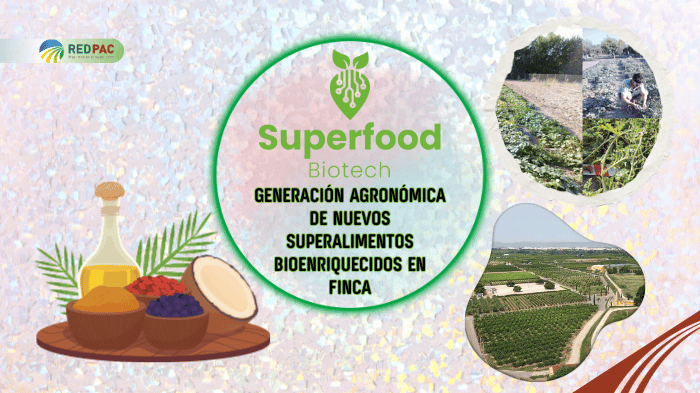
06 de May de 2024
Innovación
The project aims to improve the nutrient content of fruit and vegetable products and generate bio-healthy foods through agronomic methods. It is working to create a new category of superfoods with a higher content of bio-healthy micronutrients.
- The "Superfood Biotech" Operational Group aims to improve the nutritional quality of foods and adapt to consumer demands.
- The project conducts trials on farms to find new techniques that achieve nutritional improvement efficiently and with a lower environmental impact.
What do extra virgin olive oil, honey, turmeric, avocado, and chia seeds have in common? Aside from being classic examples of healthy foods and, as always, coming from the effort and investment of agricultural producers, there's something else: they're "superfoods."
"Superfoods" are a type of food that, according to proponents of the term, has special health benefits. Furthermore, they are consumer products that have not traditionally been as appreciated and are assumed to be complete due to their richness in bioactive and nutrient-rich components.
The Superfood Biotech Task Force was founded in July 2023 to create solutions and opportunities from these superfoods. With the subtitle "Agronomic Generation of New Bio-Enriched Superfoods on the Farm," the group aims to improve the nutrient content of fruit and vegetable products and generate bio-healthy foods through agronomic methods .
Thus, the main objectives of the project are:
- Optimize production methods to improve the functional quality of fruit and vegetable products and their derivatives.
- Develop mineral-enriched foods using biotechnology and innovative fertilization practices, focusing on the post-harvest stage of fruits and vegetables, incorporating chelated surface minerals.
- Increase the nutritional value of fruit and vegetable crops to enhance their yield and nutritional quality.
- Combating the effects and production losses caused by mineral and nutritional deficiencies in farmland, exacerbated by climate change.
- Contribute to mitigating the effects of climate change through interventions in soils to improve the agronomic quality of crops and increase the absorption and fixation of CO2 and greenhouse gases.
- Develop innovative products fortified with nutrients , especially minerals, to meet new consumer demands and promote healthier lifestyles by transforming primary production systems and the food industry.
All of this would be applicable, according to your intentions, to edible fruits, citrus peels and melons.
Actions
To meet the proposed objectives, the Operational Group is taking action through a series of actions:
- Field protocol : the project develops specific regulations for obtaining fruits and vegetables with particularly rich nutritional characteristics.
- A better agricultural and forestry sector: promoting efficiency, production, and environmental friendliness through reduced emissions and greater respect for the climate.
- Mineralization: Increase mineralization, promote soil-plant microbiome symbiosis, and enrich soils with more organic matter.
- Irrigated crops: extending the benefits of new products to irrigated crops, primarily.
Thus, the Superfood Biotech Operational Group is working to create a new category of superfoods that increases the content of bio-healthy micronutrients and conducts experimental tests with citrus fruits, vegetables, and edible fruits, thereby providing technical and economic demonstrations of the solutions the group presents.
Furthermore, the aspect of environmental respect is attempted to be achieved through two ways:
- Demonstrate that fruit and vegetable products bioenriched with microorganisms and microalgae are capable of consuming less water and electricity .
- Establish the actual reduction of CO 2 emissions in the production of biofertilizers .
Some of these processed products, such as juices and food preparations, as well as the by-products and waste derived from them, will be characterized as “SUPERFOOD BIOTECH highly bioenriched products.”
Finally, the biological, economic, employment, sustainability, and entrepreneurial impact is very promising for a project at this level of innovation. "GO Superfood benefits consumers, farmers, and producers in the agri-food industry," the group states on its website.
Concrete results
For now, the project has already been launched on farms in Huétor-Tajar (Granada) and Sinyent (Poliñá de Júcar, Valencia), where trials have been conducted on several plant species. They have found that incorporating microalgae into biofortification treatments can boost plant growth, combat water stress, and possibly increase nutrient uptake in the roots.
This is just one example of the trials they will conduct to ultimately achieve ("superfood") products like the one last summer at the Granada farm, where the weight of the watermelons increased thanks to their iodine fortification.
Partners and financing
The Superfood Biotech supra-regional Operational Group is made up of the Young Farmers Agrarian Association ( ASAJA ) , the Institute of Agrochemistry and Food Technology of the CSIC ( IATA ) , the National Association for Technology Transfer to Agriculture and Livestock (ASETAGA ) , AMC Natural Drinks Group , Agroisa and InnoPlant .
The project has a total investment of 591,232.64 euros, 100% financed by the European Union through the European Agricultural Fund for Rural Development ( EAFRD ), managed by the General Directorate of Rural Development, Innovation and Agri-Food Training ( DGDRIFA ) of the Ministry of Agriculture, Fisheries and Food of theGovernment of Spain .









